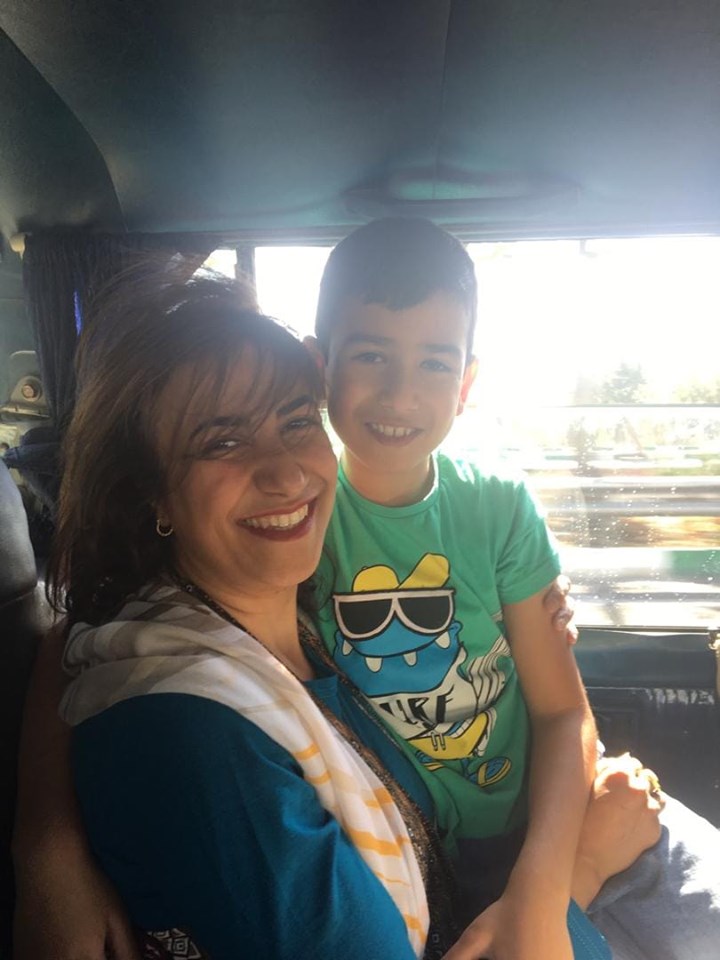Source: www.hra-news.org
Translation by Iran Press Watch

HRA News Agency (HRANA) – Azita Rafizadeh, a Baha’i citizen, was released from Evin Prison today after completing her sentence. She was arrested by security forces in November 2015 and transferred to this prison to serve her four-year sentence.
According to HRANA, the news arm of Human Rights Activists in Iran, on Wednesday, October 9, 2019, Azita Rafizadeh, a Baha’i citizen, was released from prison, upon the end of her sentence.
Ms. Rafizadeh has been held in Evin Prison since 2015, and her husband, Peyman Kouchak-Baghi, has been in prison since 2017. These citizens had been sentenced to four and five years in prison, respectively, under convictions for “membership in the illegal Baha’i Faith and acting against the national security through activities at the Baha’i Institute for Higher Education (BIHE)”.
From the very beginning of the imprisonment of this prisoner of conscience, her request was that “her husband’s imprisonment take place with prior notice and after receiving a summons to report for serving his sentence. The reason for this is because they have a six-year-old son who, in the absence of his mother, lives alone with his father at home. He has become increasingly attached to his father, and the possible sudden arrest of his father would cause great harm to the child.”
Despite this request, when Mr. Kouchak-Baghi was at Evin Prison on 28, February 2018, for visitation with his wife, he was detained without prior notice and transferred to Ward 8 of Evin Prison to immediately start serving his sentence. Therefore, this family’s child of was left with another family to care for him in the absence of his parents.
Peyman Kouchak-Baghi, the husband of Ms. Rafizadeh, is serving his six-year sentence in Rajai Shahr Prison in Karaj.
In June 2011, following a coordinated plan by the security apparatus to shut down the Baha’i Institute for Higher Education, in attacks on the homes of its principal and other leaders, as well as a number of its professors, Ms. Rafizadeh’s home was also raided, and books, notes and electronic devices were confiscated, including laptops and personal computers.
In 2003, Ms. Rafizadeh married Mr. Peyman Kouchak-Baghi, a graduate of the same institute in computer science. From 2006 to 2008, she continued her education in India. She succeeded in acquiring her master’s degree and returned to Iran. In order to help the Baha’i Institute for Higher Education, where she was herself educated and to which she credited her scientific life, she started teaching specialized courses; this is why she was forced to endure four years of imprisonment in Evin Prison.
Baha’is in Iran are systematically deprived of freedoms related to religious beliefs. This systematic deprivation is in direct contradiction to Article 18 of the Universal Declaration of Human Rights and Article 18 of the International Covenant on Civil and Political Rights (ICCPR), to both of which Iran is signatory: “All persons have the right to religious freedom, the right to change their religion or belief, and the freedom to express their belief individually or collectively, in public or private.”
According to unofficial sources in Iran there are more than 300,000 Baha’is living in Iran, but the Iranian constitution recognizes only the religions of Islam, Christianity, Judaism and Zoroastrianism; it does not recognize The Baha’i religion. This is why over the past years Baha’is’ rights have been systematically violated in Iran.
Leave a Reply